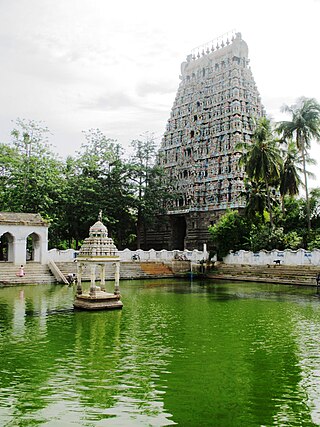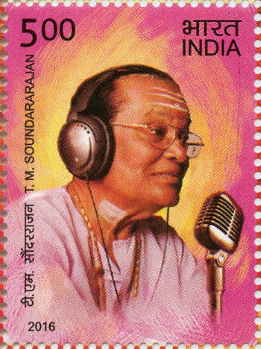
Kumbakonam, or Kudanthai, is a city municipal corporation in the Thanjavur district in the Indian state of Tamil Nadu. It is located 40 km (25 mi) from Thanjavur and 282 km (175 mi) from Chennai and is the headquarters of the Kumbakonam taluk of Thanjavur district. It is the second largest city in the district after Thanjavur. The city is bounded by two rivers, the Kaveri River to the north and Arasalar River to the south. Kumbakonam is known as a "Temple town" due to the prevalence of a number of temples here and is noted for its Mahamaham festival, which happens once in 12 years, attracting people from all over the country.

Madurai is a major city in the Indian state of Tamil Nadu. It is the cultural capital of Tamil Nadu and the administrative headquarters of Madurai District. As of the 2011 census, it was the third largest urban agglomeration in Tamil Nadu after Chennai and Coimbatore and the 33rd most populated city in India. Located on the banks of River Vaigai, Madurai has been a major settlement for two millennia and has a documented history of more than 2500 years. It is often referred to as "Thoonga Nagaram", meaning "the city that never sleeps".

Mayiladuthurai is a town and district headquarter of Mayiladuthurai district in Tamil Nadu, India. The town is located at a distance of 256 km (159 mi) from the state capital, Chennai.

Sivaganga is a town and headquarters of the Sivaganga district in the Indian state of Tamil Nadu. The town is located at a distance of 48 km (30 mi) from Madurai and 449 km from the state capital Chennai.

Walajapet is a town or first municipality of Tamil Nadu and a part of Ranipet district, Vellore Metropolitan Area, in the state of Tamil Nadu. The streets in the town form a square shape which is a unique feature of the town. It will be easy for you to reach any part of the town with this kind of infrastructure. The streets are wide and nicely structured. As of 2024, the town had a population of 64,000.

Rajapalayam is a town in the Indian state of Tamil Nadu. It is the largest municipality in the Virudhunagar district. Rajapalayam is located on the Madurai to Quilon National Highway at a distance of 562 km south of the state capital Chennai. The economy is primarily industrial with several mills for spinning and weaving. The town is known for its mango and the Rajapalayam breed of dogs.

The Vaigai is a river in the Tamil Nadu state of southern India; it passes through the towns of Theni, Madurai and Ramanathapuram. It originates in Varusanadu Hills, the Periyar Plateau of the Western Ghats range, and flows northeast through the Kambam Valley, which lies between the Palani Hills to the north and the Varushanad Hills to the south. The Vattaparai Falls are located on this river. As it rounds the eastern corner of the Varushanad Hills, the river turns southeast, running through the region of Pandya Nadu. Madurai, the largest city in the Pandya Nadu region and its ancient capital, lies on the Vaigai. The river empties into the Palk Bay near Alagankulam, close to Pamban Bridge in Ramanathapuram District.
Arakkonam is a railway town and suburb of Chennai within Chennai Metropolitan Area limit, in the Indian state of Tamil Nadu, with a population of 78,395 per the census 2011. It is in the newly created Ranipet district, about 54 kilometres (34 mi) from Ranipet headquarters and about 69 kilometres (43 mi) from the state capital of Chennai. In October 2022 Arakkonam is a part of Chennai Metropolitan Area.

Batlagundu is a town in Nilakottai block in Dindigul district in the Madurai Region state of Tamil Nadu, India. The name Vetrilaikkundru later transformed and changed to Vathalagundu. The town is the major gateway to Kodaikanal. Subramaniya Siva was a writer, Indian Freedom Fighter, and activist born in Batlagundu. Batlagundu is the fifth-largest town in the Dindigul district. The town is located in such a way connecting three main districts of South Tamil Nadu. Batlagundu has most of the voters in Nilakottai Constituency.

Thoguluva Meenatchi Iyengar Soundararajan, popularly known as TMS, was an Indian Carnatic musician and a playback singer in Tamil cinema for over six and a half decades. He sang over 10,138 songs from 3,162 films, including devotional, semi-classical, Carnatic, classical and light music songs. He gave classical concerts starting in 1943.

Sengottai is a town in the Tenkasi district, of Tamil Nadu, India. It is the gateway to southern Tamil Nadu and Kerala. Spread over an area of 2.68 km2 with a population of over 26,823, the economy of the town and Sengottai Taluk revolves around the cultivation of rice,coconut,Mango,clove and pepper. Sengottai is well known in Tamil Nadu as a major market of Dosa kal. This town has lot of Black smith shops.

The Vaigai Dam is built across the Vaigai River near Andipatti, in the Theni district of Tamil Nadu, southern India. Near the dam, the Government of Tamil Nadu has constructed an Agricultural Research Station for researching the growing of a variety of crops, including rice, sorghum, blackgram, cowpea and cotton.

The seventh legislative assembly election to Tamil Nadu was held on 28 May 1980. The election was held two years before the end of the term of M. G. Ramachandran administration, as it was dissolved for the failure of state machinery by the then President of India Neelam Sanjiva Reddy. Dravida Munnetra Kazhagam allied with the Indian National Congress (Indira) and All India Anna Dravida Munnetra Kazhagam with Janata Party. Despite their landslide victory of 37 out of 39 seats at the general election in January 1980, DMK and Indira Congress failed to win the legislative assembly election. AIADMK won the election and its leader and incumbent Chief Minister MGR was sworn in as Chief Minister for the second time.

The Tiruchirappalli City Municipal Corporation is the municipal corporation which looks after the city administration of Tiruchirappalli in Tamil Nadu, India. It consists of a legislative and an executive body. The legislative body is headed by the city mayor while the executive body is headed by a Chief Commissioner.

Salem City Municipal Corporation (SCMC) is a civic body that governs Salem city, Tamil Nadu, India. It consists of a legislative and an executive body. The legislative body is headed by the city mayor while the executive body is headed by a Chief Commissioner. This corporation consists of 60 wards and is headed by a Mayor who presides over a Deputy Mayor and 60 councillors who represent each ward in the city. SCMC is the fifth largest municipal corporation in Tamil Nadu. For administrative purposes, the Salem corporation is divided into four zones: Suramangalam, Hasthampatty, Ammapettai, and Kondalampatty. Each Zonal Office has its own Zonal Chairman and an Asst. Commissioner to take care of Zonal Activities.

The Coimbatore City Municipal Corporation is the civic body that governs the city of Coimbatore in the Indian state of Tamil Nadu. It is the second largest municipal corporation in Tamil Nadu after Chennai with an area of 257.04 sq km.
Madurai is a city in the Indian state of Tamil Nadu and administrative headquarters of Madurai District. It is the third largest municipal corporation in Tamil Nadu.

Dr. K. Vijayakarthikeyan is an Indian author, bureaucrat, civil servant and currently serving as the secretary of Tamil Nadu State Human Rights Commission. He served as the Collector of Tiruppur District in Tamil Nadu, Commissioner & Special Officer, Coimbatore City Municipal Corporation, Assistant Collector (Trainee) at Erode and Sub Collector at Kovilpatti before his appointment as Director for Tamil Nadu Institute of Urban Affairs Coimbatore City.
Sivakasi City Municipal Corporation is the civic body governing city of Sivakasi in Indian state of Tamil Nadu. Municipal Corporation mechanism in India was introduced during British Rule with formation of municipal corporation in Madras (Chennai) in 1688, later followed by municipal corporations in Bombay (Mumbai) and Calcutta (Kolkata) by 1762. Sivakasi City Municipal Corporation is headed by Mayor of city and governed by Commissioner.
Karur City Municipal Corporation is the civic body governing city of Karur in Indian state of Tamil Nadu. Municipal Corporation mechanism in India was introduced during British Rule with formation of municipal corporation in Madras (Chennai) in 1688, later followed by municipal corporations in Bombay (Mumbai) and Calcutta (Kolkata) by 1762. Karur City Municipal Corporation is headed by Mayor of city and governed by Commissioner. Karur is also one of the fastest growing cities of Tamil Nadu. Karur was a historical city and played a major role in the history of Tamil country.


















